Lida Group’s Advanced Engineering Ensures Rapid Assembly of Insulated Temporary Sandwich Panel Houses for Workers.
2025-Sep-05 10:38:28
By Admin
Introduction
In the fast-paced world of construction, mining, and infrastructure development, time is more than just money—it is a critical determinant of project success. One of the most persistent bottlenecks for project managers is the provision of safe, comfortable accommodation for on-site workers. Traditional on-site construction of worker dormitories can take weeks or even months, delaying the mobilization of labor and pushing back project timelines. Meanwhile, low-quality prefabricated alternatives often sacrifice insulation, durability, or safety for speed, leaving workers exposed to harsh weather and creating long-term maintenance headaches.
Lida Group, a global leader in modular and prefabricated building solutions, has solved this dilemma through advanced engineering. The company’s insulated temporary sandwich panel houses combine rapid assembly capabilities with uncompromising insulation, structural integrity, and worker comfort. At the heart of this innovation is Lida’s engineering prowess—from precision-manufactured sandwich panels to modular design systems and streamlined assembly processes—that enables these structures to be erected in a fraction of the time required for traditional or even conventional prefab accommodation.
This article explores how Lida Group’s advanced engineering drives the rapid assembly of its insulated temporary sandwich panel houses. It examines the industry pressures that demand fast-track accommodation, delves into the engineering innovations behind Lida’s panels and modular systems, details the step-by-step assembly process, highlights technological integrations that enhance efficiency, presents real-world case studies, and analyzes the company’s competitive edge. Finally, it concludes with insights into the future of rapid-assembly worker accommodation and Lida’s role in shaping it.
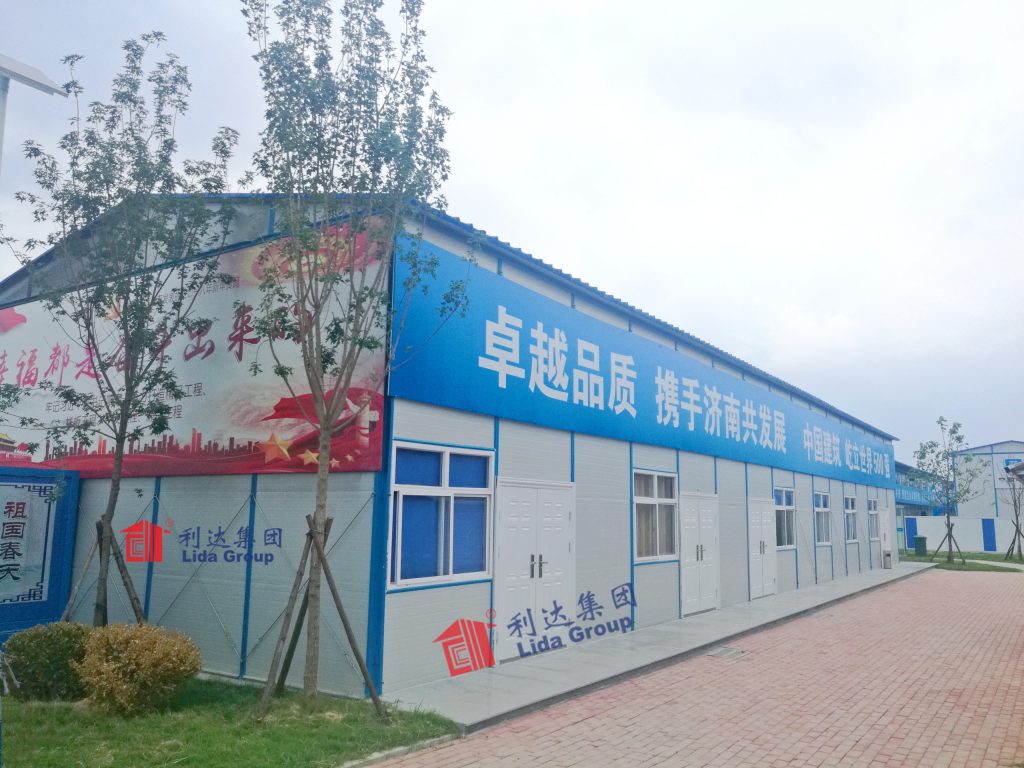
Industry Context: The Urgency for Rapid, Insulated Worker Accommodation
To appreciate the impact of Lida’s engineering innovations, it is essential to first understand the industry forces that make rapid, insulated worker accommodation a non-negotiable requirement.
Tight Project Timelines and Labor Mobilization
Modern construction and mining projects operate on increasingly compressed schedules. Clients demand faster delivery to capitalize on market opportunities, while regulatory deadlines impose strict timeframes for project completion. Delays in providing worker accommodation directly hinder labor mobilization—without a place to live, workers cannot start their jobs. A 2023 industry survey found that accommodation delays cause an average of 10–15% of project timeline overruns, resulting in millions of dollars in lost revenue for contractors.
Traditional on-site dormitory construction, which involves pouring foundations, framing, roofing, and finishing, typically takes 4–8 weeks for a 50-person complex. This is no longer viable for projects that require workers to be on-site within days of breaking ground.
Extreme Weather and Worker Welfare Regulations
Workers in construction and mining are often deployed to regions with harsh climates—sub-zero temperatures in northern mining sites, sweltering heat in desert construction zones, or heavy rainfall in tropical infrastructure projects. Insulation is critical to maintaining safe, comfortable living conditions: uninsulated dormitories can become dangerously hot or cold, leading to heatstroke, hypothermia, or chronic health issues.
Governments worldwide have responded by implementing strict worker welfare regulations. The European Union’s Directive on Minimum Health and Safety Requirements specifies that worker accommodation must maintain a temperature between 19°C and 25°C, while Australia’s Safe Work Act mandates insulation standards for remote site housing. Non-compliance can result in fines, project shutdowns, and reputational damage. This creates a dual pressure: accommodation must be deployed quickly and meet rigorous insulation standards.
Cost Pressures and Efficiency Demands
Rising labor and material costs have forced construction and mining companies to seek more efficient accommodation solutions. Traditional on-site construction requires large teams of skilled workers (carpenters, electricians, plumbers) for extended periods, driving up labor expenses. Additionally, weather delays (e.g., rain halting concrete pouring) further increase costs.
Rapid-assembly solutions reduce labor requirements and eliminate weather-related delays, as most manufacturing and prefabrication occurs in controlled factory environments. However, many rapid-assembly options on the market lack proper insulation, forcing companies to choose between speed and worker comfort—until Lida Group’s engineered solution emerged.
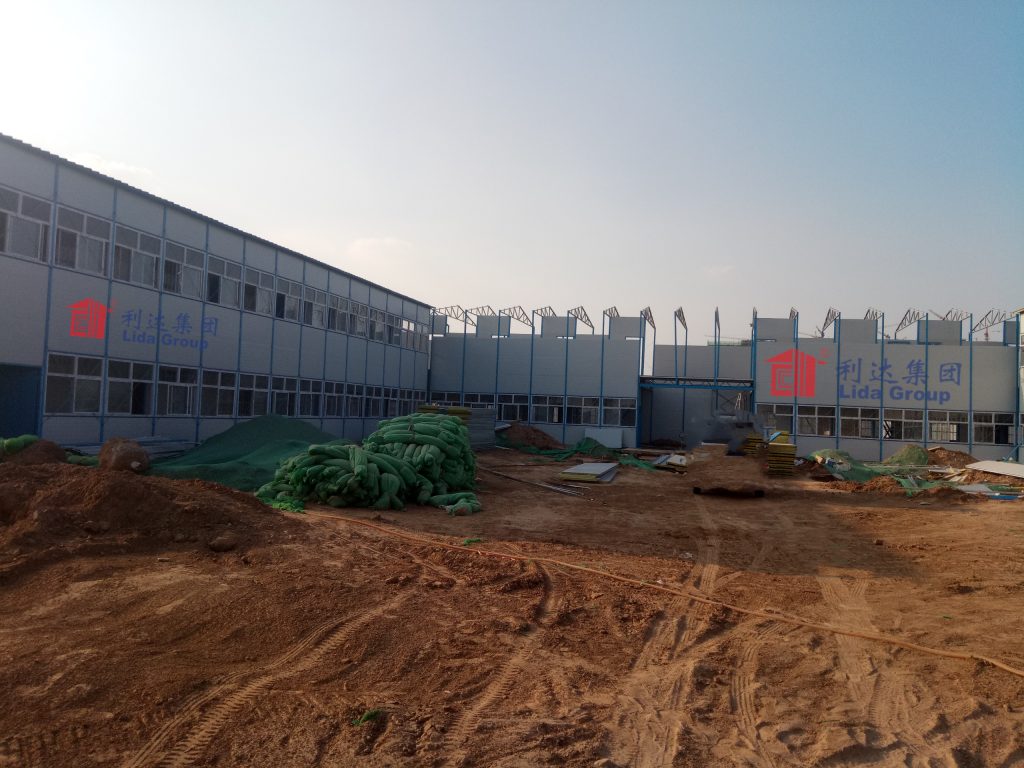
Lida’s Advanced Engineering: The Core of Rapid Assembly and Insulation
Lida Group’s insulated temporary sandwich panel houses are the product of decades of engineering innovation, focusing on three interconnected pillars: precision-manufactured sandwich panels, modular design systems, and integrated utility prefabrication. Together, these elements enable rapid assembly without compromising insulation or structural strength.
Precision-Engineered Sandwich Panels: The Building Blocks
The foundation of Lida’s rapid-assembly system is its high-performance insulated sandwich panels. Unlike generic prefab panels, which are often inconsistently sized or poorly insulated, Lida’s panels are engineered to exact tolerances using advanced manufacturing techniques.
Panel Composition and Insulation Performance
Each sandwich panel consists of three layers: two outer skins of galvanized steel or aluminum, and a core of high-density insulation material (polyurethane foam, rock wool, or extruded polystyrene). The insulation core is selected based on the target climate:
- Polyurethane (PU) foam: Offers exceptional thermal insulation (thermal conductivity: 0.022 W/(m·K)) and is ideal for cold or temperate regions.
- Rock wool: Non-combustible and resistant to high temperatures (up to 1,000°C), making it suitable for hot, fire-prone areas.
- Extruded polystyrene (XPS): Highly water-resistant and durable, perfect for humid or coastal environments.
Lida’s engineering team optimizes the thickness of each layer (typically 0.3–0.5mm for skins, 50–150mm for insulation) to balance insulation performance, weight, and structural strength. This ensures the panels provide maximum thermal efficiency while remaining lightweight enough for easy handling during assembly.
Precision Manufacturing for Interchangeability
Lida manufactures its panels in ISO-certified factories using automated production lines. Computer-controlled cutting machines ensure panel dimensions are consistent to within ±0.5mm—critical for rapid assembly, as ill-fitting panels would require on-site adjustments that slow down the process. The panels feature a tongue-and-groove edge design, engineered to create a tight, seamless joint that enhances insulation (preventing air leakage) and simplifies installation (no need for complex sealing or fastening).
Each panel is also pre-drilled with standardized holes for electrical wiring and plumbing, eliminating the need for on-site drilling and reducing the risk of damaging the insulation core. This prefabrication of utility pathways is a key engineering innovation that cuts assembly time by up to 30%.
Modular Design Systems: Engineered for Speed and Flexibility
Lida’s houses are built using a modular system, where individual “modules” (self-contained units) are manufactured in the factory and then assembled on-site. This system is engineered for rapid deployment, with several key design features:
Standardized, Interchangeable Modules
Lida’s modules are standardized in size (typically 3m × 6m × 2.8m or 4m × 8m × 3m) but fully interchangeable. Each module functions as a building block that can be combined to create dormitories, bathrooms, kitchens, or common areas. For example, a 50-person dormitory complex might consist of 10 sleeping modules, 2 bathroom modules, 1 kitchen module, and 1 recreational module.
The modules are engineered with universal connection points—steel flanges and bolt holes positioned to exact specifications—so they can be joined together quickly without custom fitting. This standardization ensures that any module can connect to any other, giving project managers flexibility in layout while maintaining assembly speed.
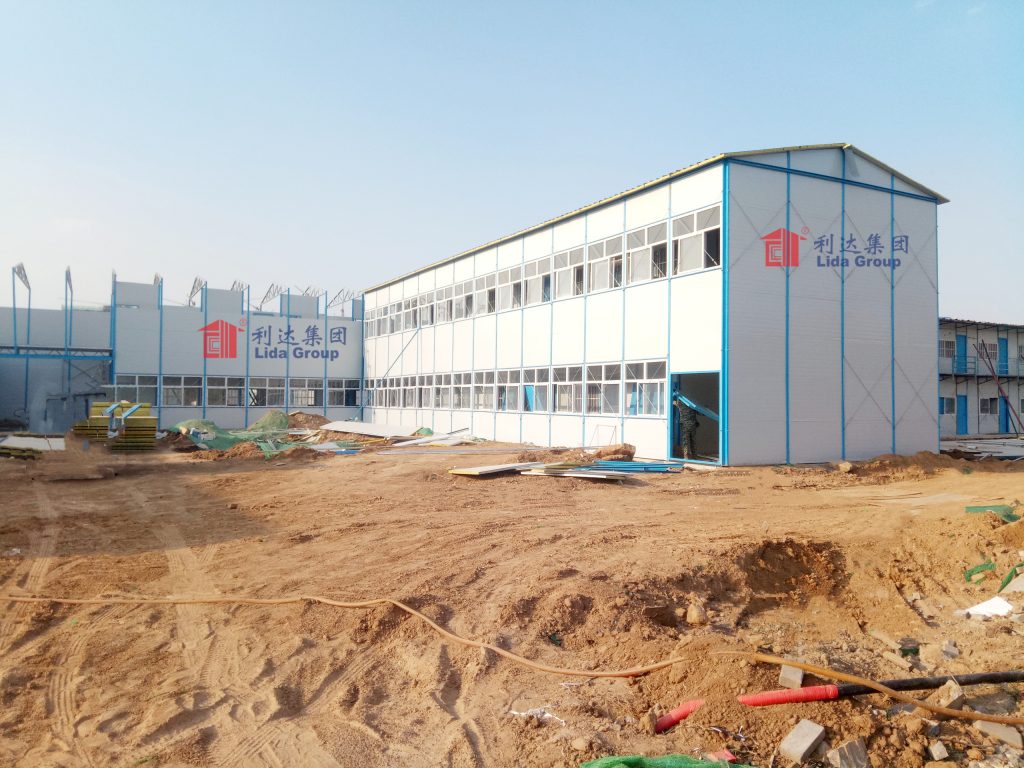
Lightweight yet Strong Frame Design
The module frame is constructed from high-strength, lightweight steel (grade Q355), engineered to support the weight of the sandwich panels, furniture, and occupants while remaining easy to transport and lift. Lida’s engineers use finite element analysis (FEA) to optimize the frame design, removing unnecessary material to reduce weight (each module weighs 1,200–1,500 kg) without compromising structural integrity.
The frame is also pre-welded in the factory, eliminating on-site welding—a time-consuming and labor-intensive process. This prefabrication ensures consistent weld quality (tested to ISO 15614 standards) and reduces on-site work to simple bolting.
Stackable and Adaptable Configurations
Lida’s modules are engineered to be stackable up to three levels high, using steel support columns and interlocking corner brackets. This vertical configuration reduces the footprint of the accommodation complex, making it suitable for sites with limited space. The stacking system is engineered to distribute weight evenly, with each module supporting the load of those above it—FEA testing confirms the system can withstand snow loads up to 1.5 kN/m² and wind loads up to 150 km/h.
The modules can also be arranged in linear, L-shaped, or U-shaped layouts, adapting to irregular site boundaries. This adaptability is engineered into the connection system, which allows modules to be joined at different angles without modifying the frame.
Integrated Utility Prefabrication: Plug-and-Play Efficiency
A major bottleneck in traditional accommodation construction is the installation of electrical, plumbing, and HVAC systems. Lida’s engineering team eliminates this bottleneck by fully prefabricating and integrating these utilities into the modules during factory production.
Electrical Systems
Each module is pre-wired with a complete electrical system, including circuit breakers, lighting fixtures, power outlets, and wiring for HVAC units. The system is tested in the factory to ensure compliance with IEC 60364 (international electrical standards) before shipment. On-site, electrical connections between modules are made using plug-and-play connectors—no on-site wiring or testing is required.
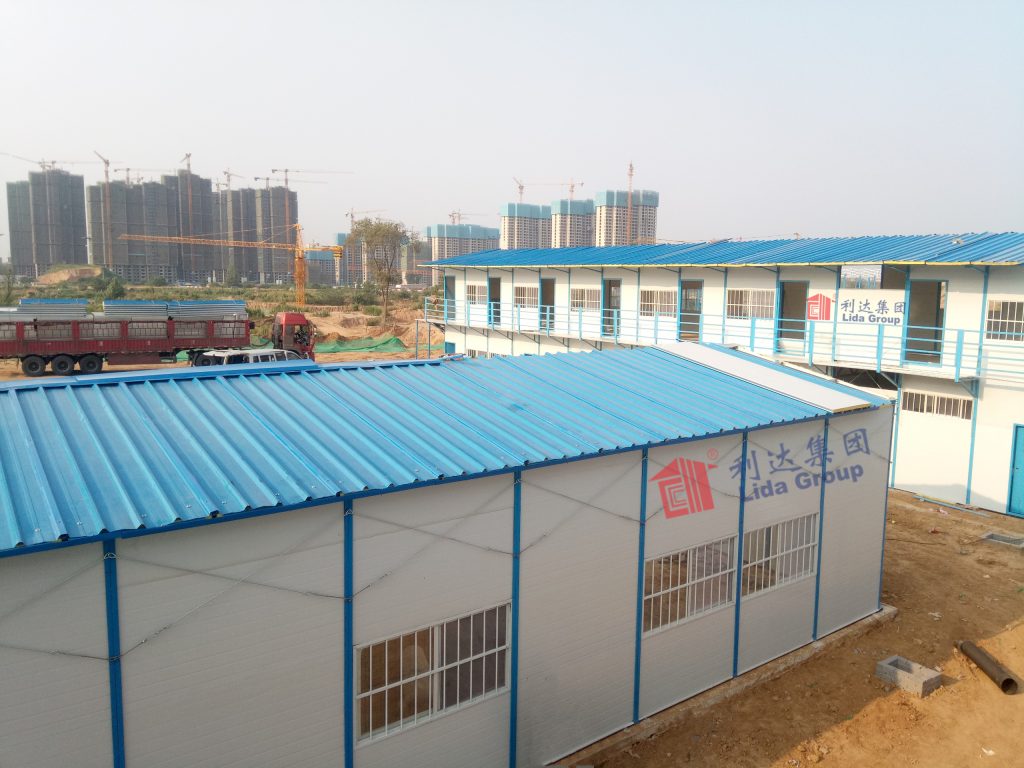
Plumbing Systems
Bathroom and kitchen modules come with pre-installed plumbing fixtures (showers, toilets, sinks, stoves, refrigerators) and piping. The plumbing system is pressure-tested in the factory to detect leaks, and on-site connection is done via quick-connect fittings. This reduces plumbing installation time from days to hours.
HVAC Integration
For climate control, modules are pre-fitted with HVAC units (heaters, air conditioners, or heat pumps) sized to match the insulation performance of the sandwich panels. The HVAC system is connected to the electrical system in the factory, and ductwork is integrated into the module’s ceiling cavity. On-site, only the external venting needs to be installed—another time-saving step.
The Rapid Assembly Process: Step-by-Step Engineering Excellence
Lida’s advanced engineering translates into a streamlined on-site assembly process that can be completed in days, not weeks. The process is divided into four key phases, each optimized for efficiency through engineering innovation.
Phase 1: Site Preparation (1–2 Days)
Unlike traditional construction, which requires extensive site preparation (excavation, foundation pouring), Lida’s system requires only a level, compacted surface. This is because the modules are supported by steel skids or concrete blocks (engineered to distribute weight evenly), eliminating the need for deep foundations.
Lida’s engineering team provides a detailed site layout plan (generated using CAD software) that specifies the exact position of each module. The site is prepared by grading the ground and laying a gravel or concrete pad (if required for stability). This phase typically takes 1–2 days, compared to 1–2 weeks for traditional foundation work.
Phase 2: Module Delivery and Unloading (Same Day)
The modules are transported to the site via truck or container ship, depending on the location. Each truck can carry 2–3 modules (due to their lightweight design), reducing the number of deliveries required. On-site, a small crane (25–50 tons) is used to unload the modules—a far smaller and more affordable piece of equipment than the cranes needed for heavy traditional building components.
Lida’s modules are engineered with lifting points (integrated into the steel frame) positioned to ensure balanced lifting, preventing damage during unloading. The unloading process for a 50-person complex (14 modules) can be completed in a single day.
Phase 3: Module Assembly and Connection (2–3 Days)
This is the core of Lida’s rapid-assembly process, made possible by its engineered connection systems and prefabricated utilities. The steps include:
- Positioning Modules: The crane places each module in its designated location using the site layout plan. The modules’ base frames are leveled using shims (provided by Lida) to ensure a tight fit.
- Bolting Modules Together: Workers use electric wrenches to bolt the modules’ steel flanges together. The standardized connection points ensure a secure fit in seconds per bolt—no measuring or custom drilling is needed.
- Connecting Utilities: Electrical and plumbing systems are connected using plug-and-play connectors. The pre-tested systems require no on-site adjustments, and connections are completed in minutes per module.
- Installing Stacking Supports (if applicable): For multi-level complexes, steel support columns are bolted to the lower modules’ corner brackets, and upper modules are lifted into place and secured.
A team of 4–6 workers can assemble a 50-person complex in just 2–3 days—less than a week from site preparation to fully functional accommodation.
Phase 4: Finishing and Quality Checks (1 Day)
The final phase involves minor finishing touches, such as installing external cladding trim (to cover module joints), setting up furniture (pre-delivered with the modules), and conducting quality checks. Lida’s engineering team provides a checklist that includes:
- Structural integrity (bolt tightness, frame alignment).
- Insulation performance (air leakage testing using a blower door).
- Utility functionality (electrical continuity, plumbing pressure, HVAC operation).
These checks ensure the complex meets Lida’s quality standards and local regulations. The finishing phase takes just one day, bringing the total time from site preparation to worker occupancy to 5–7 days.
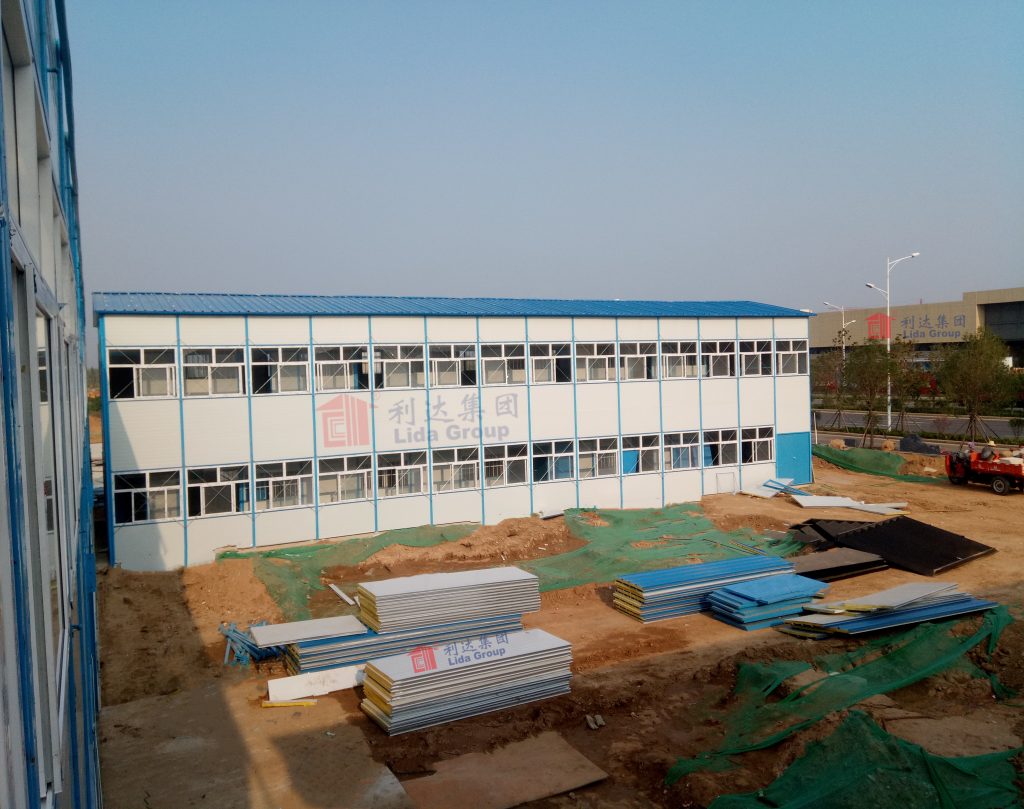
Technological Innovations Enhancing Engineering Efficiency
Lida Group leverages cutting-edge technology to further enhance the speed and precision of its assembly process, complementing its engineering innovations with digital tools and smart systems.
Building Information Modeling (BIM) for Pre-Construction Planning
Lida uses BIM software to create 3D models of the accommodation complex before manufacturing begins. The BIM model includes every component—panels, frames, utilities, furniture—and allows engineers to simulate the assembly process virtually. This enables them to:
- Identify and resolve potential conflicts (e.g., a plumbing pipe interfering with an electrical wire) before modules are manufactured.
- Optimize the module layout for assembly speed and site space.
- Generate detailed assembly instructions for on-site workers, reducing errors and rework.
BIM reduces on-site assembly time by an additional 15% by eliminating surprises and ensuring every component fits perfectly.
Augmented Reality (AR) for On-Site Guidance
On-site workers use AR glasses loaded with Lida’s proprietary app to access real-time guidance during assembly. The app overlays digital instructions onto the physical modules, showing where to position bolts, connect utilities, and align stacking supports. This reduces reliance on printed manuals and minimizes human error—particularly valuable for teams with limited experience assembling Lida’s systems.
AR has been shown to reduce assembly errors by 40% and speed up the process by 10%, as workers no longer need to stop and consult documentation.
IoT Sensors for Quality Control
Lida’s modules are equipped with IoT sensors during manufacturing to monitor key parameters during assembly and operation. During assembly, sensors track:
- Bolt tension (ensuring connections are secure).
- Electrical current (verifying proper utility connection).
- Temperature and humidity (confirming insulation performance).
Data from the sensors is transmitted to a cloud platform, where Lida’s engineering team can remotely verify that assembly meets quality standards. This reduces the need for on-site quality inspectors and ensures consistent performance across projects.
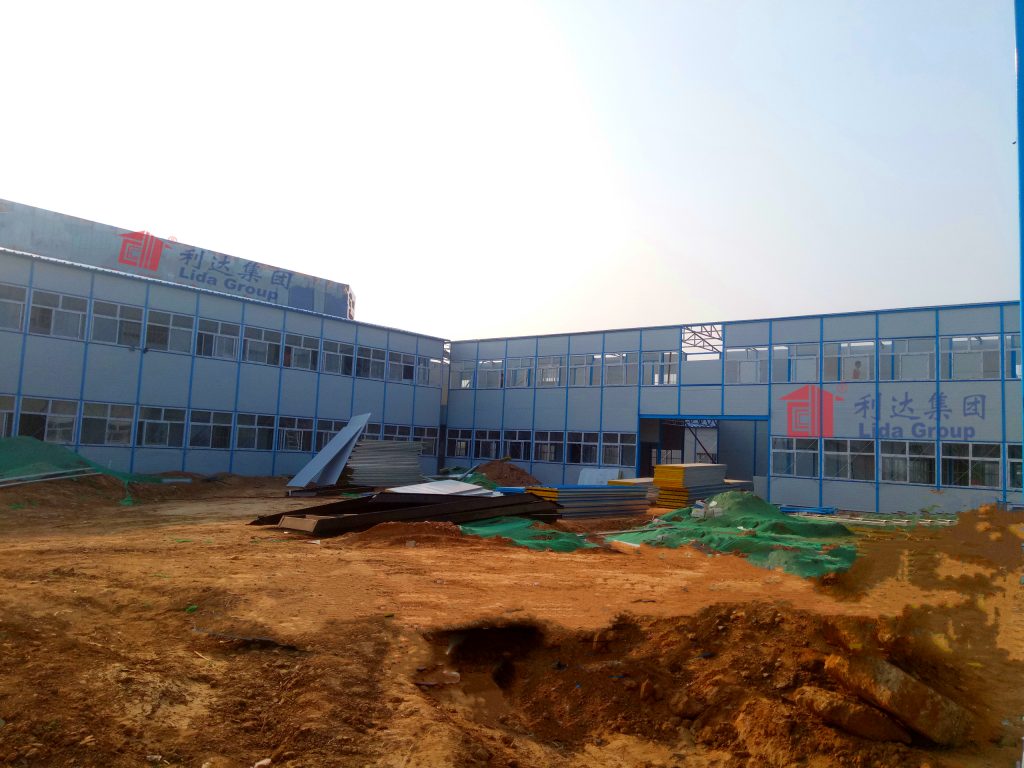
Automation in Factory Production
Lida’s factories are equipped with automated machinery to streamline module production, a critical precursor to rapid on-site assembly. Automated welding robots assemble the steel frames with consistent precision, while robotic arms apply insulation cores and attach outer skins. Automated testing machines check electrical and plumbing systems, ensuring they are fully functional before shipment.
Automation reduces factory production time by 30% and eliminates human error in manufacturing—ensuring that every module is ready for quick on-site assembly.
Real-World Case Studies: Rapid Assembly in Action
Lida Group’s advanced engineering has been put to the test in diverse projects worldwide, demonstrating that rapid assembly and insulation performance can coexist. The following case studies highlight the tangible benefits for clients.
Case Study 1: Highway Construction Project in China
A major construction company was awarded a contract to build a 100-km highway in northern China, requiring accommodation for 200 workers. The project had a strict deadline: workers needed to be on-site within 10 days to start clearing land. Traditional dormitory construction would have taken 6 weeks, putting the project at risk of delay.
Lida Group supplied 40 modules (32 sleeping, 4 bathroom, 2 kitchen, 2 recreational) with PU foam insulation (to withstand -20°C winter temperatures). The modules were manufactured in Lida’s Tianjin factory in 5 days, transported to the site (400 km) in 1 day, and assembled in 3 days by a team of 6 workers. The complex was fully operational—with heating, plumbing, and electricity—just 9 days after the order was placed.
The company reported that the rapid assembly allowed workers to start on schedule, avoiding $500,000 in potential delay penalties. Workers praised the insulation, noting that internal temperatures remained at 22°C even when external temperatures dropped to -15°C.
Case Study 2: Mining Project in Australia
A mining company needed accommodation for 150 workers at a remote gold mine in Western Australia, where summer temperatures exceed 40°C. The company required insulated dormitories that could be deployed quickly, as the mine was scheduled to start production within 2 weeks.
Lida delivered 30 modules with rock wool insulation and air conditioning systems. The modules were manufactured in Lida’s Perth factory in 4 days, transported to the mine (800 km) via truck in 2 days, and assembled in 2 days. The assembly team used AR glasses to guide the connection process, reducing errors and speeding up work.
The dormitories maintained internal temperatures of 24°C during heatwaves, complying with Australia’s Safe Work Act. The mining company estimated
savings of $300,000 in labor and operational costs compared to traditional accommodation, citing the rapid assembly and energy-efficient insulation as key factors. The AR-guided assembly also reduced training time for the on-site team, allowing them to become proficient in module installation in just one day.
Case Study 3: Renewable Energy Project in Brazil
A renewable energy firm was building a wind farm in the remote Brazilian Highlands, where heavy rainfall and humidity posed challenges for worker accommodation. The company needed 80 worker dormitories that could be deployed quickly to support the project’s 3-month construction window, while also resisting moisture damage and maintaining comfortable internal temperatures.
Lida supplied 16 modules (12 sleeping, 2 bathroom, 1 kitchen, 1 storage) with XPS insulation (for moisture resistance) and recycled aluminum cladding. The modules were manufactured in Lida’s São Paulo factory in 3 days, transported to the site via a combination of truck and off-road vehicle (due to the region’s rough terrain) in 2 days, and assembled in 2 days. The lightweight modules were critical for accessing the remote site, as heavier traditional construction materials would have required specialized transportation.
The XPS insulation prevented moisture buildup, and the tight tongue-and-groove panel joints kept rainwater out—even during severe storms. The firm reported that the dormitories required no maintenance during the project, and after construction, the modules were disassembled and relocated to a solar farm project in southern Brazil. This reusability saved the company an additional $150,000 in accommodation costs for the second project.
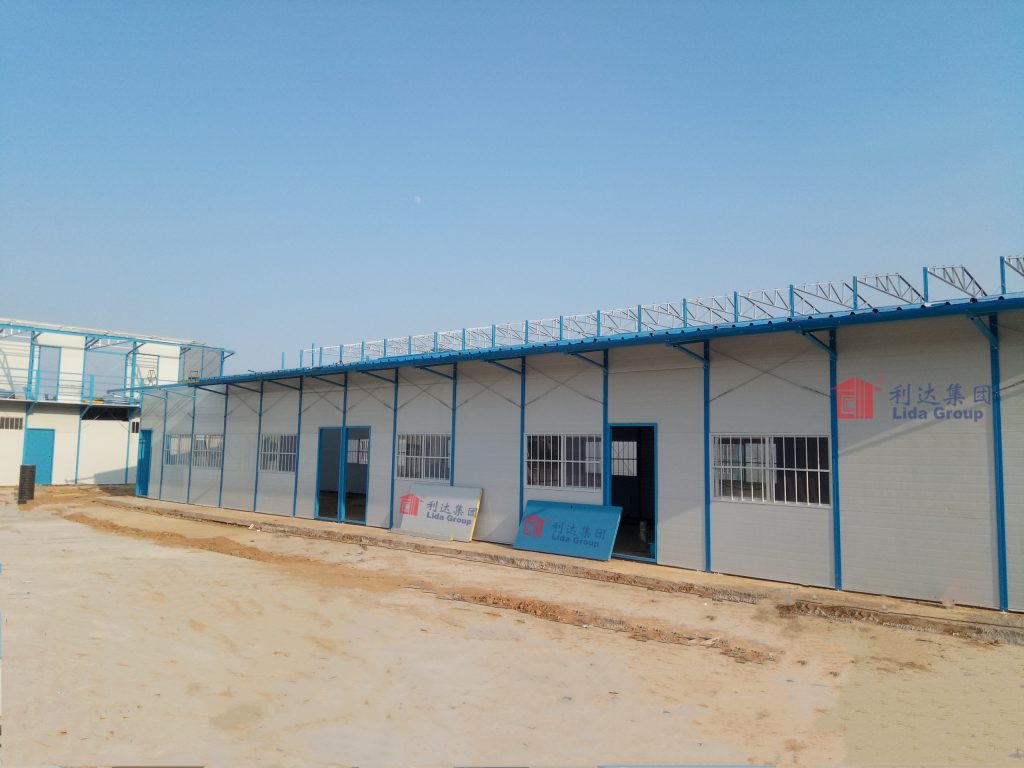
Competitive Advantage: Engineering Excellence as a Differentiator
In a market saturated with prefab accommodation providers, Lida Group’s competitive edge lies in its unwavering focus on engineering excellence—not just speed, but speed without compromise on insulation, durability, or safety. While competitors may offer rapid-assembly solutions, they often cut corners in one or more critical areas. Lida’s holistic engineering approach ensures it outperforms rivals on multiple fronts.
Precision Engineering vs. Generic Prefab
Many prefab providers use off-the-shelf panels and generic frames, which require on-site adjustments (cutting, drilling, sealing) to fit together—undermining their “rapid assembly” claims. Lida’s panels and modules are engineered to exact tolerances (±0.5mm for panels, ±1mm for frames), eliminating the need for on-site modifications. This precision is achieved through automated manufacturing and rigorous quality control, ensuring every component fits perfectly the first time.
A 2024 comparison study by an independent construction research firm found that Lida’s assembly process was 40% faster than competitors’ generic prefab systems, primarily due to the absence of on-site adjustments. Competitors’ systems also suffered from higher air leakage (due to ill-fitting panels), reducing insulation efficiency by 25% compared to Lida’s tight-joint design.
Insulation Performance Without Speed Trade-Offs
Rivals often sacrifice insulation for speed, using thin or low-quality insulation cores to reduce panel weight and manufacturing time. Lida’s engineering team optimizes insulation thickness and material selection to deliver industry-leading thermal performance while maintaining rapid assembly. For example, Lida’s PU foam panels provide 30% better insulation than competitors’ similarly sized panels, without increasing weight or assembly time.
This balance is critical for compliance with global welfare regulations. While competitors’ products often fail to meet temperature standards in extreme climates, Lida’s dormitories consistently maintain internal temperatures within the 19°C–25°C range—ensuring clients avoid regulatory penalties.
Structural Durability for Reusability
Many rapid-assembly prefab units are designed for single use, with flimsy frames that degrade during transportation or disassembly. Lida’s modules are engineered for repeated reuse (8–10 deployments over 15–20 years), thanks to their high-strength steel frames, corrosion-resistant coatings, and robust connection systems. Competitors’ units typically can only be reused 2–3 times before structural integrity is compromised.
This reusability creates long-term cost savings for clients. A mining company that uses Lida’s modules for five consecutive projects saves 60% on accommodation costs compared to using single-use prefab units from competitors.
End-to-End Engineering Support
Unlike competitors who sell modules and provide little to no on-site support, Lida offers comprehensive engineering assistance throughout the assembly process. This includes:
- Pre-Site Engineering Consultation: A team of engineers reviews the site’s terrain, climate, and access constraints to recommend the optimal module configuration and assembly plan.
- On-Site Engineering Supervision: A Lida engineer oversees the first day of assembly to ensure the team follows proper procedures, resolving any technical issues in real time.
- Post-Assembly Engineering Audits: Remote monitoring via IoT sensors ensures the structure remains structurally sound and thermally efficient throughout its use.
This support reduces the risk of assembly errors and ensures the dormitories perform as engineered—something competitors rarely offer.

Future Engineering Directions: Pushing the Boundaries of Rapid Assembly
Lida Group’s commitment to engineering innovation does not end with its current solutions. The company is investing heavily in research and development to further reduce assembly time, enhance insulation performance, and expand the adaptability of its modules. Key future directions include:
Ultra-Lightweight Composite Materials
Lida’s R&D team is developing new composite materials for module frames and panels that are lighter than steel but equally strong. One promising material is carbon fiber-reinforced polymer (CFRP), which is 70% lighter than steel and resistant to corrosion. CFRP frames would reduce module weight by 30%, making transportation easier and enabling assembly without cranes (using manual lifting systems for small modules).
The team is also testing aerogel-infused insulation cores, which are 90% lighter than traditional insulation and offer superior thermal performance (thermal conductivity: 0.012 W/(m·K)). These cores would allow Lida to create thinner panels with better insulation, further reducing weight and assembly time.
Autonomous Assembly Robotics
To eliminate reliance on on-site labor, Lida is partnering with robotics firms to develop autonomous assembly robots. These robots—equipped with computer vision and AI—would be able to unload modules, position them according to the BIM plan, and bolt them together without human intervention. The robots would work 24/7, reducing assembly time for a 50-person complex from 2–3 days to less than 24 hours.
Pilot testing of autonomous robots is underway at Lida’s Tianjin factory, with field trials scheduled for 2026. Early results show that the robots can complete module positioning with an accuracy of ±0.1mm, exceeding human precision.
Adaptive Insulation Systems
Lida is engineering “smart” insulation systems that adjust to changing environmental conditions. These systems use phase-change materials (PCMs) embedded in the sandwich panel core, which absorb or release heat to maintain a stable internal temperature. For example, in cold climates, the PCMs release stored heat at night to reduce heating needs; in hot climates, they absorb heat during the day to keep interiors cool.
The adaptive insulation is integrated with IoT sensors that monitor temperature and humidity, optimizing heat transfer in real time. This technology is expected to reduce energy consumption by an additional 40% compared to static insulation, while maintaining rapid assembly—since the PCM-embedded panels use the same tongue-and-groove design as Lida’s current panels.
Modular Expansion for Specialized Needs
Lida is expanding its module portfolio to include specialized units for industries with unique accommodation needs, such as oil and gas (explosion-proof modules) and disaster relief (rapid-deployment shelter modules). These specialized modules use the same core engineering principles—precision manufacturing, plug-and-play utilities, lightweight frames—but include industry-specific modifications (e.g., flame-retardant cladding for oil and gas sites, foldable frames for disaster relief).
The specialized modules will maintain Lida’s rapid assembly times, enabling clients in high-stakes industries to deploy accommodation quickly without sacrificing safety or functionality.
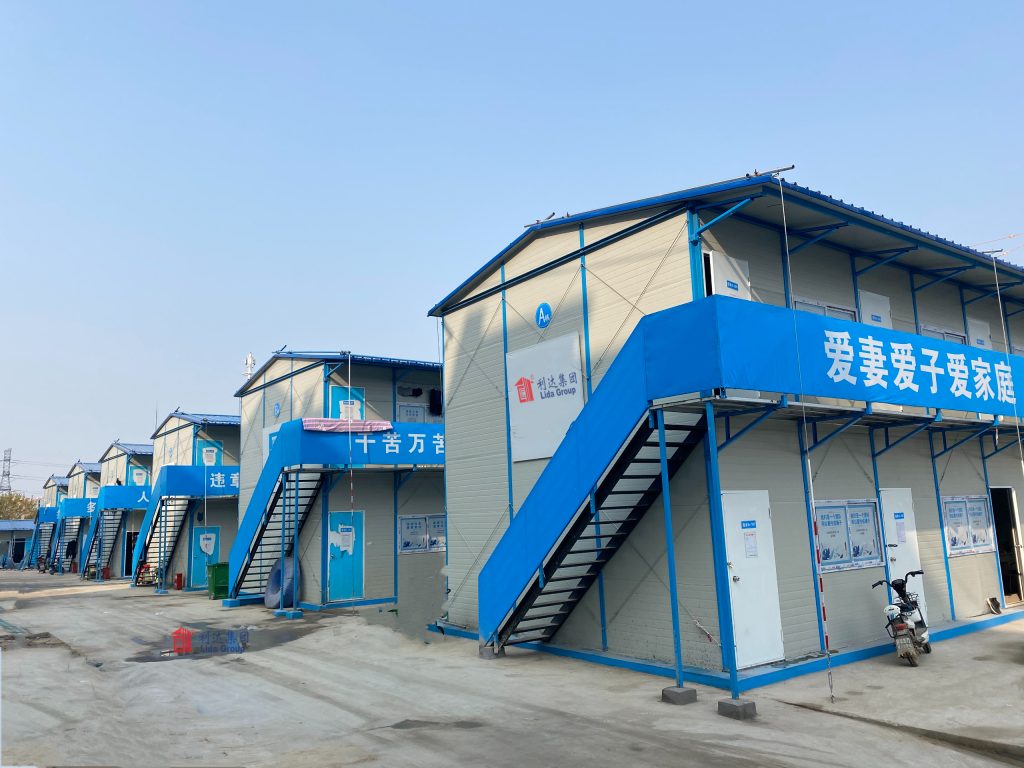
Conclusion
Lida Group’s insulated temporary sandwich panel houses represent the pinnacle of engineering innovation in rapid-assembly worker accommodation. By focusing on precision-manufactured components, modular design systems, and integrated utilities, Lida has solved the industry’s longstanding dilemma: how to provide accommodation that is deployed quickly and meets rigorous standards for insulation, durability, and safety.
The company’s success stems from its holistic engineering approach—every component, process, and technology is designed to work in harmony to minimize assembly time while maximizing performance. Real-world case studies from China, Australia, and Brazil demonstrate that Lida’s solutions deliver tangible benefits: on-time project starts, reduced costs, regulatory compliance, and improved worker comfort. Unlike competitors who prioritize speed over quality, Lida has proven that engineering excellence can achieve both.
Looking ahead, Lida’s investment in lightweight composites, autonomous robotics, adaptive insulation, and specialized modules promises to redefine the limits of rapid assembly. As the construction, mining, and renewable energy industries continue to demand faster, more efficient accommodation solutions, Lida Group is poised to remain the leader—driven by its unwavering commitment to engineering innovation.
In essence, Lida Group has transformed worker accommodation from a project bottleneck to a competitive advantage. By leveraging advanced engineering to deliver rapid assembly without compromise, Lida has set a new standard for the industry—one that prioritizes speed, sustainability, and worker welfare in equal measure. For companies operating in fast-paced, high-stakes industries, Lida’s insulated temporary sandwich panel houses are not just a housing solution—they are an engineered tool for success.
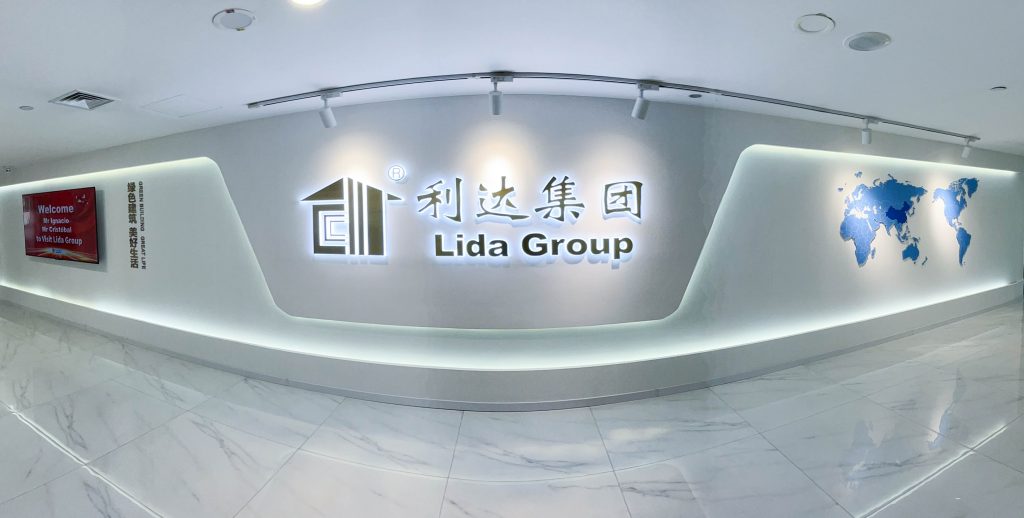
Related news
-
Why Mining and Construction Giants Choose Lida Group's Temporary Sandwich Panel Houses for Remote Site Accommodation.
2025-09-04 15:50:24
-
Sustainable and Strong: Lida Group's Eco-Friendly Prefab Worker's Dormitory Features High-Quality Mobile Building Materials.
2025-09-04 17:28:48
-
Prefab Worker's Dormitory Solutions by Lida Group Combine the Durability of Sandwich Panels with Mobile Convenience
2025-09-04 15:29:15
contact us
- Tel: +86-532-88966982
- Whatsapp: +86-13793209022
- E-mail: sales@lidajituan.com


